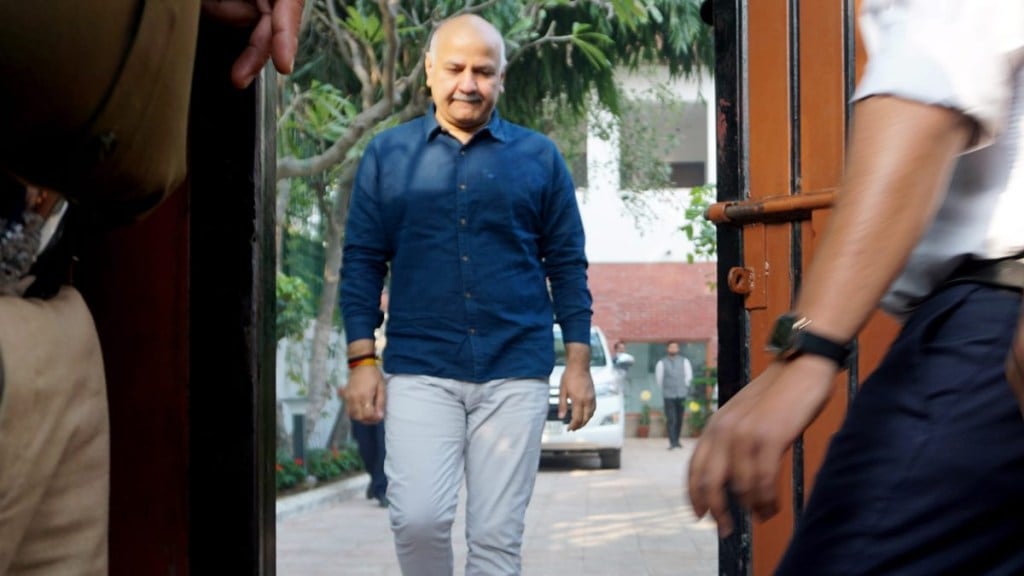The Central Bureau of Investigation (CBI) on Sunday night arrested Delhi’s Deputy Chief Minister Manish Sisodia in connection with alleged corruption in the now-scrapped Delhi Excise Policy 2021-22 case. The Deputy CM’s arrest comes months after the arrest of Delhi’s then Health minister Satyendar Jain, who was put behind bars in June 2022.
Sisodia was arrested after nearly eight hours of interrogation. Following his arrest, the CBI, in a statement, said that the deputy CM gave “evasive replies” and “did not cooperate” with the probe agency’s investigation “despite being confronted with evidence to the contrary”.
“The Central Bureau of Investigation has today arrested Dy. Chief Minister of GNCTD, Delhi in an ongoing investigation of a case related to alleged irregularities in framing and implementation of the excise policy of GNCTD,” the CBI said in the statement Sunday.
The instant case was registered against Sisodia, who was in-charge of the Excise department, and 14 others to probe into “alleged irregularities in framing and implementation of Excise Policy for the year 2021-22 and extending post tender benefits to private persons”.
The probe agency said that a chargesheet was filed on December 25, 2022 against the then-CEO of a Mumbai-based private company along with six others. It said that an investigation in the case is underway.
It said that under section 41 A of the CrPC, Sisodia was issued a notice to come for probe by the agency on February 19, 2023. However, he had sought a week’s time “citing his pre-occupation”.
“Accepting his request, he was issued a notice u/s 41A Cr.P.C for attending the investigation today (on 26.02.2023) for answering various questions evaded by him during his examination on 17.10.2022 and further questions relating to his incriminating role based on evidence collected during investigation of the case,” it said.
He was arrested for not cooperating with the investigation and for avoiding clarifications sought on crucial points, it said.
What is the Delhi Excise Policy 2021-22 case?
The Delhi Excise Policy 2021-22, which was implemented on November 17, 2021, came under the scanner when Delhi Lieutenant Governor VK Saxena recommended a CBI inquiry over alleged violations of rules and procedural lapses in the formulation and implementation of excise policy. His action was based on a report which was submitted by Delhi Chief Secretary Naresh Kumar.
Kumar’s report alleged that Sisodia provided undue benefits to liquor vend licensees in lieu of “kickbacks” and “commissions” that were allegedly used by the Aam Aadmi Party in the Punjab elections that took place in February, reported The Indian Express.
Under the policy, Delhi was divided into 32 excise zones and retail liquor licenses were issued to private players for 849 vends. It marked the exit of the government from the liquor business in Delhi.
The Delhi government had said that the policy aimed to “end the liquor mafia and black marketing, increase revenue and improve the consumer experience, and ensure equitable distribution of liquor vends”.
CBI booked Sisodia in November
Sisodia, who also holds the finance portfolio in the Delhi Cabinet, was originally summoned last Sunday but he sought deferment of his questioning citing the ongoing Budget exercise, following which, the CBI had asked him to appear on February 26. This was the second round of questioning of Sisodia after the agency registered a case on August 17 last year. He was quizzed in October last year.
The FIR registered by the CBI earlier in November framed him under IPC sections 120-B (punishment of criminal conspiracy) and 477A (falsification of accounts) and provisions of the Prevention Of Corruption Act including Section 7 (taking undue advantage to influence a public servant by corrupt or illegal means or by the exercise of personal influence).
Sisodia under scanner in Feedback Unit case
The central probe agency is also probing Sisodia in another case pertaining to the alleged creation of a ‘feedback unit’ (FBU) case, which alleged that the AAP government had created an FBU under the vigilance department to snoop into individuals, including the Opposition party members. The Ministry of Home Affairs (MHA) on February 22 gave sanction to prosecute him under the Prevention of Corruption Act in connection with the case.

